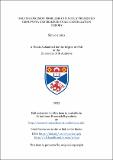Solving decision problems in finitely presented groups via generalized small cancellation theory
View/
Date
13/06/2023Author
Funder
Grant ID
EP/R513337/1
Keywords
Metadata
Show full item recordAbstract
This thesis studies two decision problems for finitely presented groups. Using a standard RAM model of computation, in which the basic arithmetical operations on integers are assumed to take constant time, in Part I we develop an algorithm IsConjugate, which on input a (finite) presentation defining a hyperbolic group 𝐺, correctly decides whether 𝑤₁ ϵ 𝑋* and 𝑤₂ ϵ 𝑋* are conjugate in 𝐺, and if so, then for each 𝑖 ϵ {1,2}, returns a cyclically reduced word 𝑟ᵢ that is conjugate in 𝐺 to 𝑤ᵢ, and an 𝑥 ϵ 𝑋* such that r₂= G 𝑥^{-1} r_1 x (hence if 𝑤₁ and 𝑤₂ are already cyclically reduced, then it returns an 𝑥 ϵ 𝑋* such that 𝑤₂=_G x^{-1} w_1 x). Moreover, IsConjugate can be constructed in polynomial-time in the input presentation < 𝑋 | 𝑅 >, and IsConjugate runs in time O((|𝑤₁| + |𝑤₂| min{|𝑤₁|, |𝑤₂|}).
IsConjugate has been implemented in the MAGMA software, and our experiments show that the run times agree with the worst-case time complexities. Thus, IsConjugate is the most efficient general practically implementable conjugacy problem solver for hyperbolic groups.
It is undecidable in general whether a given finitely presented group is hyperbolic. In Part II of this thesis, we present a polynomial-time procedure VerifyHypVertex which on input a finite presentation for a group G, returns true only if G is hyperbolic. VerifyHypVertex generalizes the methods from [34], and in particular succeeds on all presentations on which the implementation from [34] succeeds, and many additional presentations as well. The algorithms have been implemented in MAGMA, and the experiments show that they return a positive answer on many examples on which other comparable publicly available methods fail, such as KBMAG.
Type
Thesis, PhD Doctor of Philosophy
Collections
Description of related resources
Solving decision problems in finitely presented groups via generalized small cancellation theory (thesis data) Jurina, S., University of St Andrews, 21 Mar 2023. DOI: https://doi.org/10.17630/0f7a7c71-26f5-4346-9bf1-3da33e354721Related resources
https://doi.org/10.17630/0f7a7c71-26f5-4346-9bf1-3da33e354721Items in the St Andrews Research Repository are protected by copyright, with all rights reserved, unless otherwise indicated.

